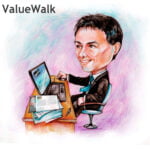There is no single, straightforward formula to make big money in the market. Each money manager has their own set of strategies and philosophies that helped them create stupendous wealth. And some of them went on to become legends by consistently outperforming the markets for long periods. Here we take a look at the top 10 greatest investors of all time.
Q1 2020 hedge fund letters, conferences and more
A lot of money managers outperform the broader market for short periods. But there are only a few who have generated massive wealth for themselves and their investors by beating the market over decades.
It's almost impossible to compare the performance and track record of legendary investors because they operated in different economic, political and regulatory environments, and they employed different strategies at different times. Anyway, we have attempted to list the ten greatest investors of all time here. Check out the list.
10- Michael Steinhardt
Forbes magazine has called Michael Steinhardt "The Greatest Trader in Wall Street History." He launched the hedge fund Steinhardt Partners in 1967. Between 1967 and 1995, the hedge fund delivered a staggering 24.7% annualized return for investors, after fees. Steinhardt took 20% of the profits. A $10,000 invested in Steinhardt Partners in 1967 would have grown to $4.8 million in 1995 when he closed his fund. That's impressive, especially considering his fund had lost one-third of its value during the 1994 bond market crisis.
9- Philip Fisher
Philip Fisher is the author of the book Common Stocks and Uncommon Profits. He launched his own money management firm Fisher & Company in 1931, right in the middle of the Great Depression. He led the investment firm until his retirement in 1999 at the age of 91. Fisher is considered the pioneer of "growth investing." He famously purchased the Motorola stock in 1955 when it was a radio manufacturer and held it until his death in 2004.
8- John Templeton
Sir John Templeton pioneered the globally diversified mutual funds. Money magazine named him "The greatest stock picker of the century" in 1999. His Templeton Growth Fund returned 15% annualized return over a period of 38 years. He launched the Templeton Growth Fund in 1954 and sold it to the Franklin Group in 1992. John Templeton started out during the Great Depression by purchasing 100 shared of each NYSE-listed company that was selling for less than $1 per share.
7- Walter Schloss
Walter Schloss was a legendary value investor and the disciple of Benjamin Graham. He never went to college. Instead, he started working as a runner on Wall Street in 1934. He worked for Benjamin Graham before launching his own investment firm in 1955. Between 1956 and 1984, his fund achieved annualized returns of 21.3%. Schloss stopped managing others' money in 2003. During the 48 years of its existence, the WJS Partnership averaged a 20% compound return.
6- Shelby Davis
Very few investors have heard of Shelby Davis. He worked as a journalist, investment banker, and diplomat. Davis didn't start investing until he was 38 years old, when he founded Shelby Cullom Davis & Company with $50,000. He invested primarily in insurance companies. His firm generated 22% CAGR over a period of 45 years. Despite starting late, Shelby Davis had amassed $900 million by the time of his death in 1994.
5- Stanley Druckenmiller
A disciple of George Soros, Stanley Druckenmiller is one of the greatest investors of all time. His trading style is similar to that of George Soros. He ran Soros Fund Management's Quantum Fund in the 1990s. Druckenmiller founded his own hedge fund Duquesne Capital in 1981, which has returned an average of 30% annually to investors over a period of 30 years. Druckenmiller has made some insanely bold bets in his investing career, and has changed course the moment he realized he was wrong.
4- Benjamin Graham
The father of value investing has authored two classics: Security Analysis and The Intelligent Investor. His disciples include Sir John Templeton, Warren Buffett, and Walter Schloss. Benjamin Graham's Graham-Newman Partnership averaged 21% annualized return between 1936 and 1956. He invested $712,000 in GEICO in 1948, and the position skyrocketed to a little over $400 million in 1972. Graham was one of the biggest proponents of margin of safety in one's investments.
3- George Soros
Soros is one of the greatest investors of all time. He is often referred to as “The man who broke the Bank of England.” In 1992, he shorted $10 billion worth of pound sterling and made more than $1 billion during the UK currency crisis in a single day! He closed the Soros Fund Management to outside investors in 2011. While running the Quantum Fund, he returned 32% annually to investors over a 26-year period.
2- Jim Simons
Jim Simons’ Renaissance Technologies is one of the world’s largest hedge funds. The flagship Medallion fund has returned a staggering 66% annually before fees and 39% after fees between 1988 and 2018. However, the Medallion Fund has been closed to outside investors for years. Renaissance Technologies launched the Renaissance Institutional Equities Fund (RIEF) and Renaissance Institutional Diversified Alpha (RIDA) in 2005 for outside investors.
1- Warren Buffett
Has the Oracle of Omaha averaged better returns than Jim Simons? No. But the fact that Warren Buffett has outperformed the broader market for almost six decades makes him the greatest investor of all time. Buffett's Berkshire Hathaway has averaged 20.3% compound return between 1965 and 2019 compared to 10% for the S&P 500. A $10,000 invested in Berkshire Hathaway in 1965 would have been worth $274.4 million in 2019! By comparison, the same amount invested in the S&P 500 would have grown to $1.97 million in the same period. Berkshire Hathaway has under-performed the S&P 500 over the last decade, and many are questioning Buffett's ability to run the company. But nobody can deny that his long-term performance has been otherworldly.












